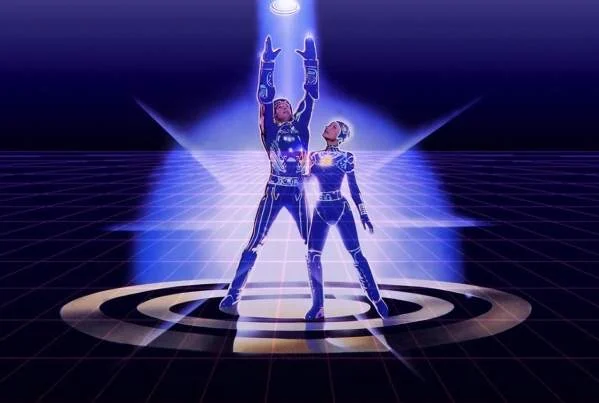Having recently revisited Tron, I was very surprised by how much I still enjoyed it, because there’s nothing worse than when a childhood favorite doesn’t hold up in your adult years.
I didn’t even realize Tron was a flop until years after the fact. For a kid who spent his whole summer at the movies and at the video arcade, it was a perfect blend of video game fun, and blockbuster thrills. Other movies have tried to bring the thrill of video games to the big screen, and Tron was the only movie that actually succeeded at doing it.

I was also surprised at how well the special effects held up, and Tron was state of the art for the time.
Harrison Ellenshaw was the visual effects artist of the film, and as he told me, “Tron was the first extensive use of computer graphics in a motion picture, almost fifteen minutes worth. Up until that time, it was maybe up to a minute at most in Westworld.”
The fact that the effects were done in nine months was “an insane accomplishment,” Ellenshaw continues. “80% of the rotoscoping, ink and paint was done overseas in a four month period. Just sending half a million animation cells to Taiwan and back and not losing anything was a monumental task!”
Right before the film’s release on July 8, 1982, Disney thought it had the next Star Wars, so how could a movie that was right on the cutting edge like this lose? Not to mention 1982 was an insane summer for genre films with E.T., Star Trek II, The Road Warrior, Poltergeist, The Thing, and Blade Runner.
Tron creator Steve Lisberg felt, “Graphically and visually a lot of people can’t handle that much art. It was like we put LSD in the punchbowl at the school prom, and it was just way more than they could handle. I thought Tron was gonna blow people’s minds, but people don’t want their minds blown by Disney, they want to be reassured by them. And the idea that Disney was gonna mess with your head was almost incomprehensible to the vast majority.”
Ellenshaw also felt, “The effects overwhelmed the story. Once you got inside the computer, you didn’t get back into the outside world until the very end. You never saw what the real world was doing while these guys were inside the computer trying to save the earth. I think that made the film less relatable to a lot of people.”
According to the book Disney War, the company, who has always been notoriously cheap, wouldn’t put up more bucks for the advertising campaign, thinking word of mouth would carry the film. (It didn’t.
Of course, Tron’s current following is strong enough that the film warranted a sequel last year. Back in the day, Tron was a major pioneer in digital effects, even inspiring John Lassater of Pixar to dive headfirst into computer animation.
”I’m more pleased with what’s happened with the film now,” Lisberger says. “It’s had this life, and now I don’t think it’s ever going away.”






